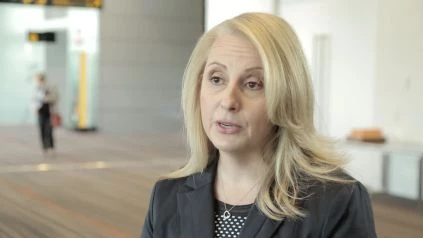Merran Findlay, AdvAPD of The University of Sydney, Sydney, Australia, explains that a diagnosis of head and neck cancer typically has a high risk of malnutrition, which may be experienced throughout treatment, even if not experienced in the earlier stages of the disease. This has a lot to do with the site of the disease and the types of treatment, such as surgery, chemotherapy, and radiation, which can have a big impact on a patients ability to eat and drink as they would normally. Feeding tubes, often temporary, may be required; however, being well nourished enables patients to get through treatment and stay out of hospital, enabling them to recover more quickly. Recorded at the Multinational Association of Supportive Care in Cancer (MASCC) and International Society of Ocular Oncology (ISOO) 2016 Annual Meeting on Supportive Care in Cancer held in Adelaide, Australia.
[the_ad id="32629"]

